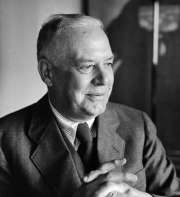|
Biography Wallace Stevens
Stevens was born in Reading, Pennsylvania on October 2, 1879, and died at the age of seventy-six in Hartford, Connecticut on August 2, 1955. He attended Harvard as a special student from 1897 to 1900 but did not graduate; he graduated from New York law school in 1903 and was admitted to the New York bar in 1904, the year he met Elsie Kachel, a young woman from Reading, whom he married in 1909. They had one daughter, Holly Bight, born in 1924, conceived on a leisurely ocean voyage California via the Panama Canal that they took to celebrate the publication of his first book.
Stevens became interested in verse-writing at Harvard, submitting material to the Harvard Advocate, but he would be 36 before his first work was published in 1915. He soon was contributing to Poetry (Chicago), and his first book Harmonium was published in 1923 by the distinguished firm of Alfred A. Knopf. Though he was always much admired by his contemporaries ("There is a man whose work," Hart Crane wrote of him in 1919, "makes most the rest of us quail"), Stevens felt that the reviews of his 1923 book were less than they should be, and discouraged, wrote nothing through the 1920s. For a second edition of Harmonium, published in 1931, he added only eight new poems.
If he was not writing in the 1920s, he was steadily advancing in business. After working for several New York law firms from 1904 to 1907, he had been hired as a bonding lawyer for an insurance firm in 1908, and by 1914 was hired as the vice-president of the New York Office of the Equitable Surety Co. of St. Louis. When this job was abolished as a result of mergers in 1916, he joined the home office of the Hartford Accident and Indemnity and left New York City to live in Hartford, where he would remain the rest of his life. By 1934, he had been named Vice President of his company.
All his life Stevens collected art from abroad and saw that packages of various gourmet foods were mailed to him regularly. Although he regularly traveled in the South, most notably to Florida and the Florida Keys and Cuba, he never ventured abroad. But his cosmopolitan yearnings were amply satisfied by regular jaunts to New York City. Trains leaving Hartford on a better-than-hourly basis guaranteed that any Saturday he could be on the streets of New York City by 10 a.m. In the 1930s and 1940s, he was welcomed as a member of the exclusive set centered around the artistic and literary devotees Barbara and Henry Church.
When Stevens began to write poems with renewed fluency in the 1930s, he arranged for them to be printed in limited editions at the same time as trade editions were prepared by Knopf. Ideas of Order (1935) and Owl’s Clover (1937) were limited editions by the Alcestis Press, while The Man With the Blue Guitar (1937) and Parts of a World (1942) were printed by Knopf, and Notes toward a Supreme Fiction (1942) and Esthetique du Mal were deluxe volumes issued by the Cummington Press in 1942.
In 1939, Stevens was sixty – an age when most poets are ready to look back on what career they might have made for themselves. But Stevens’s best writing still lay before him in the form of extended meditative sequences, quasi-philosophical in their ruminative wanderings but marked always by a vivid sense of the absurd and a darting, whirling inventiveness that took delight in peculiar anecdotal examples. In the loosely connected stanzas of these sequences, "Notes Toward a Supreme Fiction" (1942), "Esthetique du Mal" (1945), "The Auroras of Autumn" (1947) and "An Ordinary Evening in New Haven" (1950), Stevens perfected what had been, in effect, the work he had been producing all along – a metapoetry that took lavish delight in commenting upon its own making. At the same time, he began to grow interested in putting his thoughts on aesthetics together in prose sentences, essays he collected in 1951 as The Necessary Angel. And there was one final, magnificent turn to his development. Entering his seventies, he began to write a poetry of late old age, in which a sense of the disembodied, the purely mental, gave rise to a discourse that had grown newly austere, solemn, and strange even to its author.
Capturing so exuberantly yet so flawlessly the mind at play with an extravagance most often associated with youthful pleasure, with the sheer delights of the sensual body, Stevens preferred to mask his very great sensual satisfactions by suggesting that his doings were in fact all a highly proper set of speculations on "the imagination." (His prose essays were useful allies in this strategy.) But the sheer verve of local moments, the sumptuous texture of outstanding passages, simply dissolves as pretense the notion that a philosophical enterprise might be underway. Few poets have so fully enjoyed not just their indulgence in their own language but also the game that elaborately insists no such indulgence is occurring.
|




